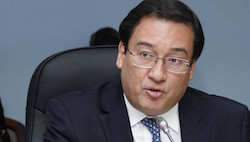El Salvador is considering allowing greater leeway for wiretaps, as the country’s worsening security situation continues to evoke concerns — most recently from Pope Francis.
El Salvador’s Congress is considering a proposal that would allow the Attorney General’s Office to tap phones for up to 72 hours before requesting a warrant from a court, reported El Diario de Hoy. The judge would then have up to 24 hours to respond to the request.
Attorney General Luis Martinez designed the proposal, which is intended to accelerate wiretaps in certain criminal investigations, including homicide, kidnapping, and embezzlement. Currently, a judge must grant approval before the Attorney General’s Office can record a suspect’s phone calls.
The proposal has provoked a wide range of reactions from across El Salvador’s political spectrum, with some worried about infringing on the right to privacy, or the possibility that wiretaps may be misused for political ends.
InSight Crime Analysis
El Salvador’s wiretap proposal evokes a familiar debate between security and the right to privacy — something recently seen in Peru, following the issuance of a legislative decree that allows law enforcement to collect phone data without a warrant.
SEE ALSO: Coverage of Security Policy
Wiretapping laws appears to be the latest measure that the Salvadoran government is considering in order to tackle the country’s worsening insecurity. While July saw fewer homicides than previous months, the first nine days in August saw 212 murders — 104 more than the same period in 2014. El Salvador’s powerful street gangs have also been enforcing a bus boycott — which the government claims has ended — that has crippled capital city San Salvador.
The country’s deteriorating security has led even Pope Francis to weigh in and express his “preoccupation” with news coming out of El Salvador. His call for unity and dialogue to reduce violence was echoed by Mari Carmen Aponte, the US Ambassador to El Salvador.
While El Salvador’s Attorney General has staunchly defended his proposal, the country’s weak institutions raise legitimate concerns over the possibility that authorities may end up abusing wiretapping. This may ultimately outweigh its perceived benefits towards reducing rampant crime and insecurity.

